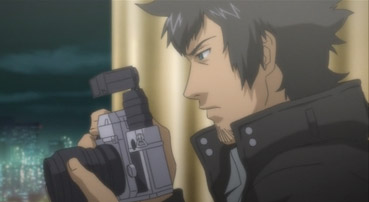"I
was teaching her that there is nothing money can't buy." |
Shinsen
after delivering a memorable lesson the
manipulative power of wealth to her shocked daughter |
The
unjust division between the richest and poorest in society
has been part of science fiction film lore since its early
days. It was the foundation of Fritz Lang's groundbreaking
1927 Metropolis, and 79 years later it's
central to Kunihisa Sugishima's intriguing anime series
Speed Grapher.
Set
in a not-too-distant future Tōkyō, a decade or so after
a conflict known as the 'Bubble War', it presents us with
a society in which increasing economic divisions have given
birth to a corrupt and super-wealthy elite, whose power
and influence is steadily growing at the expense of society's
poorest and most vulnerable. Sandwiched disdainfully between
these social extremes is Saiga, an ex-combat photographer
now denied a passport and reduced to working as a tabloid
photojournalist. He's fed the occasional crime scoop by
Ginza, a golden gun-toting female detective with an itchy
trigger finger and a cheerful disregard for the rights of
suspects. She has the hots for Saiga ("A gal who needs
a gun to get wet, a guy who needs a camera to get it up.
We're the perfect match," she tells him), who appears
to sleep with her more for business than passion, something
he left back in the war zone and has been looking to photographically
recapture ever since.

While
on a typically dull paparazzi assignment, Saiga picks up
on a lead that points him in the direction of an underground
organisation where the rich are able to satiate their
wildest sexual desires. The chosen few are offered the opportunity
to partake in a very special ceremony, where a kiss from
a goddess may bestow on them a powerful but potentially
deadly gift. Saiga gets close to this ceremony by hijacking
the disguise of one of the invited elite, but when the goddess
descends he realises that this is the perfect image he has
been searching for. Oblivious to those around him, he takes
out his camera and his cover is blown. He's on the verge
of being killed when the goddess kisses him instead of the
intended recipient. The effect on Saiga is dramatic, distorting
his features and transforming his photographic skills into
a weapon of destruction.
Speed
Grapher is less than coy about its subtext. The
rich are either easily manipulated or unscrupulously evil
and all of them are greedy, self-centred and amoral. My,
how things have changed. Prince of the dastardly elite
is Suitengu, the insanely wealthy organiser of the underground
pleasure society and whose partner Shinsen is as loaded as he
is. We know this just from where she lives, in a huge
house with a battery of servants located at the top of a
skyscraper – she even have an elevator to lower their chauffeur-driven car to street level. Not that she rides in it, as that's
there solely to transport her young daughter Kagura to school and back.
Unlike her mother, Kagura is not happy being rich – she
feels trapped and longs to know what true freedom is. Her
imagination is fired by a poster she sees around town featuring
the words "Are you happy?" and the picture of
a young girl who has lost her home and her family, but whose
expression reflects the simple freedom that Kagura aches
for. She doesn't realise that this picture was taken by Saiga. You might
wonder why she would care, but by the time we get to know
Kagura, the two are fatefully connected.
Kagura
may sound from the above description like a poor little
rich girl who is too spoilt to appreciate what she's got,
but she has good reason to fret. Her mother has taken an
increasing dislike to her, jealous that her daughter's beauty
is starting to bloom when her own is fading, and has taken to playing mind
games on her and giving her an empty lunchbox each day,
its food passed to her chauffeur to gorge on while he waits
at the school gate. What Kagura is only dimly aware of is
that it is she who fulfils the role of goddess at the ceremonies
overseen by Suitengu, and that she is imbued with a special
power that enables her, with a single kiss, to unleash in
a select few their deepest held desires as superhuman abilities,
a power known simply as Euphoria. It doesn't happen to many,
and at this early stage in the story we know only of one,
megalomaniac dancer Shironane, who in his off hours can
transform into a bendy stretchy super-villain capable of
leaping vast distances and twisting the heads off of anyone
looking to cause trouble for Suitengu's secret society.

If
all this is starting to sound a little complex, then it's
because the initially non-linear narrative is busy with
character and incident and is not interested in laying everything
out in easy steps for the sleepier audience members. It
expects you to make the connections and keep up with the unfolding story. The good
news is that this is rather easy to do, but there are
enough narrative twists to keep even the more observant
on their toes. This is particularly evident in episode 2,
which initially appears to dismiss the previous episode's
cliff-hanger ending as the dream of a character you need
to be paying attention to realise was actually part of the
earlier story at all (unless you watch the trailer at the
end of episode 1, of course). Two thirds of the way through,
a brief but perfectly timed insert establishes this episode's
timeframe in relation to that of episode 1. I, for one,
was both surprised and a little delighted – in that one
moment, so much that was mysterious suddenly fell satisfyingly
into place.
Speed
Grapher engagingly blends a number of recognisable
anime sub-genres into an enjoyable and surprisingly workable
whole. The sociopolitical thrust of the main story has within
its framework an empowered anti-hero, a super-powered villain,
and a hot-dressing but deadly girl with big guns. It's she
who provides the lighter moments in these early stages,
particularly her favourite claim when offing a bad guy that
she was acting in self defence – "Don't make
me self-defence you!" she warns one terrified unfortunate
after disposing of one of his henchmen.
A
crucial test of the first few episodes of any series is
that it hooks you enough to make you want to see more, and
Speed Grapher certainly does that. The
story is busy with incident, and though it may be a little
obvious in its socio-politics and guilty of some romantic
over-simplification (I do wonder just how 'free' the poster
girl actually feels after losing her family and home in
a war zone), its heart is still in the right place. Its
reflection of the present and increasing rich/poor divide
is not so far fetched, nor is the corruption and financial
bullying depicted here – in the Tōkyō of Speed Grapher, just about everyone has their price, and
idealists are a rare and dangerous thing. Sound familiar?
I'll
happily admit that I'm already looking forward to volume
2. It's an involving, well constructed series that throws
just enough curve balls to keep the viewer guessing, but
delivers a variety of familiar anime pleasures en route.
Just one thing – this is, like many modern anime series,
not one for the kids. If you want evidence then check out
how Shinsen deals with the teacher who drops round
to complain about her treatment of her daughter.

For
the record, Volume 1 contains the first four episodes. All
official listings have them named as Depravity City,
Goddess of Greed, Film Like a Bullet and
Lethal Headshot. The subtitles more crudely rename
them as Corrupt City, Heaps of Cash, Photographic
Death and Destruction and Plundered Girl.
Anamorphic
16:9, this is another NTSC to PAL transfer from MVM. It's
not at all bad, but the sharpness is not quite there and,
coupled with an animation style that adds a misty glow to
some edges and a white haze to whole scenes, it had me rubbing
my eyes a few times to check it was not me. This is largely
a stylistic choice by the filmmakers, though, and is still
very watchable.
The
original Japanese stereo track is joined by an American
English 5.1 dub. The 5.1 has superior bass and sporadically
effective use of the surrounds, but the dialogue is a lot
quieter in relation to the sound effects than on the stereo
track. The dubbing is pretty good as these things go, with
Christopher Sabat a suitably noir-ish Saiga, but the young
Kagura is clearly voiced by an adult. The Japanese track
is still clear and with good separation, and I'll go with
that one every time.
The
subtitles are yellow and very clear, displaying a crispness
that is superior to the picture itself. There is some minor
translation creativity, including the above detailed episode
names and the decision to change "shit" to "damn."
Character
Cast Auditions (12:25)
Voice director and line producer for the American version
Christopher Bevins talks about the voice casting process
and is accompanied by for audition examples, including the
odd fluff. This is actually more interesting than I was
expecting.
Art
Gallery (1:30)
A rolling mixture of production drawings and stills.
Textless
Opening (1:33) and Textless Closing
(1:33)
The standard graphics-free opening and closing sequences.
Not bad, but a long way short of Paranoia
Agent.
There
are also Trailers for Ikki
Tousen and The Law of the Wild.
Speed
Grapher arrives with a solid fan base already behind
it and it's not hard to see why. The first four episodes
set the series up well and leave you teasingly unsure where
it will go next. Series followers actually rate some later
episodes even higher than the early ones. Roll on volume
2!
|